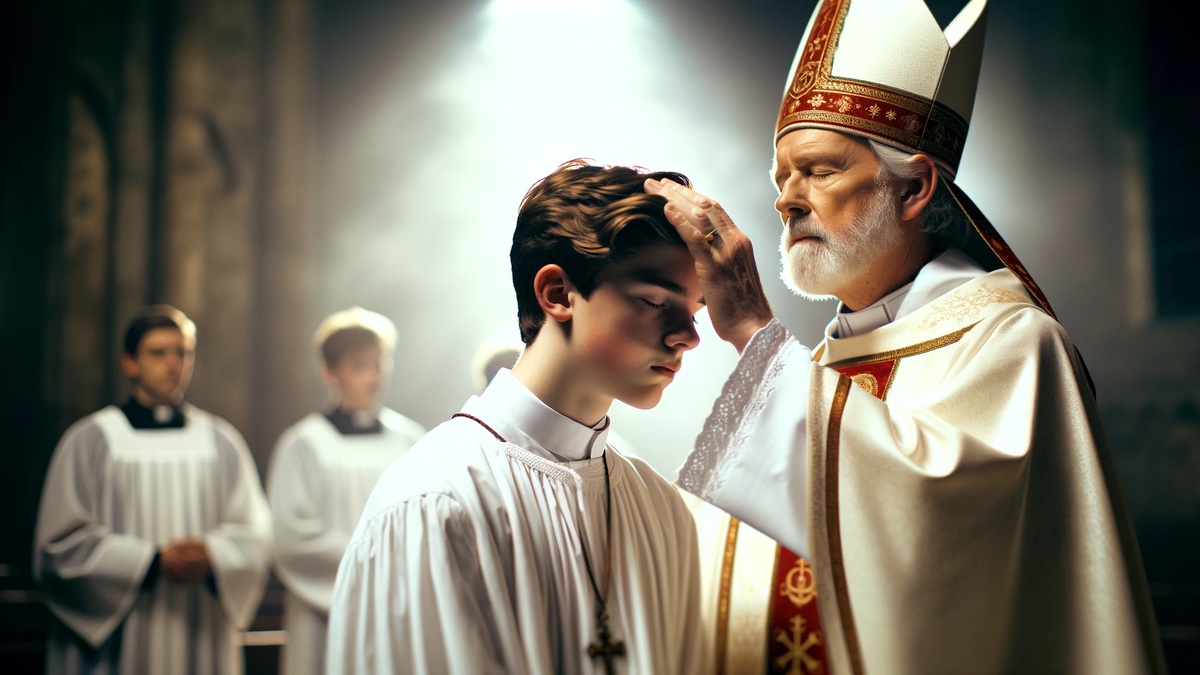Home>Theology and Spirituality>Who To Invite To First Communion


Theology and Spirituality
Who To Invite To First Communion
Published: February 19, 2024
Peter Smith, Editorial Director at Christian.net, combines deep insights into faith, politics, and culture to lead content creation that resonates widely. Awarded for his contributions to religious discourse, he previously headed a major organization for religious communicators, enhancing dialogue on faith's societal impacts.
Find out who to invite to your child's first communion with our expert guide on theology and spirituality. Ensure you have the right guests for this special occasion.
(Many of the links in this article redirect to a specific reviewed product. Your purchase of these products through affiliate links helps to generate commission for Christian.net, at no extra cost. Learn more)
Table of Contents
Introduction
First Holy Communion is a significant milestone in the life of a young Catholic, marking their initiation into the Eucharist and the wider Christian community. It is a joyous occasion that calls for careful consideration when deciding who to invite to partake in this sacred event. The guest list should reflect the solemnity of the occasion while also celebrating the young communicant's journey of faith.
As you prepare for this special day, it's important to reflect on the significance of the sacrament of Holy Communion. This is a time when the young individual is welcomed to the table of the Lord, partaking in the body and blood of Christ for the first time. It's a moment of spiritual significance and a cause for celebration within the family and the broader community.
The guest list for a First Communion should be thoughtfully curated, encompassing those who hold a special place in the communicant's life and who can share in the joy of this momentous occasion. From immediate family members to close friends, godparents, church community members, and school friends, each invitee plays a unique role in the young communicant's life and spiritual journey.
As you consider who to invite to this sacred event, it's essential to approach the task with reverence and inclusivity. The guest list should reflect the values of love, faith, and community that are central to the sacrament of Holy Communion. In the following sections, we will explore the different categories of individuals to consider inviting, each bringing their own meaningful presence to the celebration of this important step in the young communicant's faith journey.
Read more: What Is First Communion?
Immediate Family Members
The immediate family holds a central place in the life of the young communicant, and their presence at the First Communion is of utmost importance. Immediate family members typically include parents, siblings, and grandparents, all of whom play a significant role in nurturing the child's faith and spiritual growth.
Parents, as the primary educators of their children in the ways of faith, are naturally at the forefront of this sacred occasion. Their loving support and guidance have been instrumental in preparing the young communicant for this pivotal moment. Their presence at the First Communion not only signifies their commitment to their child's spiritual upbringing but also serves as a source of strength and encouragement for the communicant.
Siblings, too, share a unique bond with the communicant and are often their closest companions. Their participation in the First Communion celebration not only adds to the familial warmth of the occasion but also reinforces the sense of unity and shared faith within the family.
Grandparents, with their wisdom and experience, hold a special place in the family and often play a significant role in passing down religious traditions and values. Their presence at the First Communion is a testament to the continuity of faith across generations and serves as a source of inspiration for the young communicant.
In addition to these immediate family members, aunts, uncles, and cousins also form an integral part of the young communicant's support system. Their presence at the First Communion celebration further enriches the familial bond and reinforces the communal aspect of the sacrament.
The inclusion of immediate family members in the guest list not only honors their role in the communicant's life but also creates a nurturing and supportive environment for the young individual as they take this significant step in their faith journey. Their presence serves as a reminder of the love, guidance, and shared values that form the foundation of the communicant's spiritual upbringing.
In essence, the presence of immediate family members at the First Communion celebration symbolizes the interconnectedness of faith, love, and family, creating a sacred and joyous atmosphere that resonates with the true spirit of this momentous occasion.
Godparents
Godparents hold a significant and symbolic role in the life of a young Catholic communicant. Traditionally chosen at the time of baptism, godparents are entrusted with the important task of guiding the child in their faith journey and serving as mentors and spiritual guardians. Their presence at the First Communion is not only deeply meaningful but also reflects the continuity of their commitment to the child's spiritual well-being.
The role of godparents extends beyond the ceremonial aspects of baptism, encompassing a lifelong responsibility to nurture the child's faith and moral development. As such, inviting godparents to the First Communion is a natural and heartfelt gesture, acknowledging their ongoing support and guidance in the communicant's spiritual growth.
Godparents often share a unique and loving bond with the communicant, serving as sources of wisdom, encouragement, and spiritual counsel. Their presence at the First Communion celebration reinforces the significance of their role in the child's life and underscores the communal nature of the faith journey. By inviting godparents to this sacred event, the communicant and their family express gratitude for the godparents' unwavering commitment to the child's spiritual well-being.
In many cases, godparents play an active role in the communicant's religious education, offering guidance, support, and a nurturing presence throughout the formative years. Their participation in the First Communion celebration not only honors their role as spiritual mentors but also reaffirms the bonds of love and faith that unite the communicant with their godparents.
The presence of godparents at the First Communion serves as a poignant reminder of the interconnectedness of faith and community. It reflects the belief that the child's spiritual journey is not solitary but rather intertwined with the loving guidance and support of godparents who have pledged to walk alongside them in their faith.
In essence, inviting godparents to the First Communion is a heartfelt acknowledgment of their enduring role in the communicant's life and a reaffirmation of the sacred bond that unites them in faith. Their presence enriches the celebration, infusing it with the warmth of familial and spiritual connections, and underscores the communal nature of the young individual's faith journey.
Close Friends and Relatives
Close friends and relatives hold a special place in the life of the young communicant, contributing to their emotional and social development. When considering who to invite to the First Communion, it's important to include close friends and relatives who have played a significant role in the communicant's life and who can share in the joy of this momentous occasion.
Close friends often form deep and enduring bonds with the communicant, providing companionship, support, and shared experiences. Their presence at the First Communion celebration not only adds to the warmth and festivity of the occasion but also underscores the importance of friendship in the communicant's life. By inviting close friends, the communicant acknowledges the value of these relationships and the role they play in shaping their worldview and sense of community.
Relatives, including aunts, uncles, and cousins, also contribute to the communicant's support network and familial connections. Their presence at the First Communion serves to reinforce the bonds of kinship and shared traditions, creating a sense of unity and belonging within the extended family. It also provides an opportunity for relatives to express their love and support for the communicant as they reach this significant milestone in their faith journey.
The inclusion of close friends and relatives in the guest list reflects the communicant's desire to share this important moment with those who have been a source of joy, encouragement, and companionship. It also serves as a testament to the interconnectedness of faith and relationships, highlighting the communal nature of the young individual's spiritual journey.
In essence, inviting close friends and relatives to the First Communion celebration is a heartfelt acknowledgment of the role they have played in the communicant's life. Their presence enriches the event, infusing it with the warmth of cherished relationships and shared experiences, and reinforces the sense of community that lies at the heart of the communicant's faith journey.
Church Community Members
The church community forms an integral part of the young communicant's spiritual journey, providing a nurturing and supportive environment for their faith development. When considering who to invite to the First Communion, it is essential to extend the invitation to members of the church community who have played a significant role in the communicant's religious upbringing and who continue to offer guidance and support.
Church community members, including clergy, religious educators, and fellow parishioners, contribute to the communicant's spiritual growth through their teachings, mentorship, and communal worship. Their presence at the First Communion celebration not only reflects the interconnectedness of the faith community but also serves as a testament to the communal nature of the young individual's spiritual journey.
Clergy members, such as priests and deacons, often play a central role in the communicant's religious education and sacramental preparation. Their guidance and pastoral care have been instrumental in shaping the young individual's understanding of the Eucharist and the significance of the First Communion. Inviting clergy members to the celebration honors their dedication to nurturing the faith of the communicant and acknowledges the spiritual leadership they provide to the entire church community.
Religious educators, including catechists and teachers, also hold a special place in the communicant's faith formation. Their commitment to imparting religious knowledge and values has contributed to the communicant's preparation for this sacred milestone. Inviting religious educators to the First Communion celebration recognizes their role in shaping the communicant's religious identity and underscores the collaborative effort of the church community in nurturing the faith of its members.
Fellow parishioners, who form a supportive and inclusive community of faith, also deserve to be included in the guest list for the First Communion. Their presence at the celebration symbolizes the unity and solidarity of the church community, as they come together to rejoice in the communicant's initiation into the Eucharist. Inviting fellow parishioners fosters a sense of belonging and shared faith experiences, reinforcing the communal aspect of the young individual's spiritual journey within the church community.
In essence, inviting church community members to the First Communion celebration is a heartfelt acknowledgment of their role in the communicant's spiritual growth. Their presence enriches the event, infusing it with the warmth of communal support and shared faith, and underscores the interconnectedness of the church community in nurturing the young individual's faith journey.
Read more: When Is First Communion Held
School Friends
School friends hold a significant place in the life of the young communicant, contributing to their social and emotional development. When considering who to invite to the First Communion, it's important to include school friends who have been a source of companionship, shared experiences, and support during the formative years of the communicant's life.
School friends often form deep and enduring bonds with the communicant, creating a sense of camaraderie and shared memories. Their presence at the First Communion celebration not only adds to the warmth and festivity of the occasion but also underscores the importance of friendship in the communicant's life. By inviting school friends, the communicant acknowledges the value of these relationships and the role they play in shaping their worldview and sense of community.
The inclusion of school friends in the guest list reflects the communicant's desire to share this important moment with those who have been a source of joy, encouragement, and companionship in the school environment. It also serves as a testament to the interconnectedness of faith and relationships, highlighting the communal nature of the young individual's spiritual journey beyond the confines of the church community.
In many cases, school friends have been part of the communicant's everyday life, sharing in both academic and extracurricular activities. Their presence at the First Communion celebration not only honors the bonds of friendship but also reaffirms the significance of their role in the communicant's social and emotional development. It provides an opportunity for school friends to express their support and share in the joy of the communicant as they reach this significant milestone in their faith journey.
The presence of school friends at the First Communion serves as a poignant reminder of the interconnectedness of faith and community beyond the church setting. It reflects the belief that the child's spiritual journey is enriched by the diverse relationships and experiences encountered in the school environment. It also underscores the inclusivity of the young individual's faith journey, encompassing friendships that contribute to their overall growth and well-being.
In essence, inviting school friends to the First Communion celebration is a heartfelt acknowledgment of the role they have played in the communicant's life. Their presence enriches the event, infusing it with the warmth of cherished relationships and shared experiences, and reinforces the sense of community that lies at the heart of the communicant's faith journey.
Neighbors and Acquaintances
Neighbors and acquaintances form an integral part of the social fabric that surrounds the young communicant, contributing to their sense of community and interconnectedness. When contemplating the guest list for the First Communion, it's important to consider inviting neighbors and acquaintances who have been a part of the communicant's everyday life and who have contributed to the nurturing of a supportive and inclusive environment.
Neighbors often play a significant role in fostering a sense of belonging and shared experiences within the local community. Their presence at the First Communion celebration not only adds to the communal warmth of the occasion but also underscores the interconnectedness of faith and everyday life. By extending an invitation to neighbors, the communicant acknowledges the value of these relationships and the role they play in shaping their sense of community and belonging.
Acquaintances, including individuals from community organizations, extracurricular activities, or local gatherings, also contribute to the communicant's social interactions and broader network of connections. Their presence at the First Communion serves to reinforce the bonds of community and shared experiences, creating a sense of inclusivity and interconnectedness that extends beyond immediate circles of family and friends.
The inclusion of neighbors and acquaintances in the guest list reflects the communicant's desire to share this important moment with those who have been a part of their daily interactions and community life. It also serves as a testament to the interconnectedness of faith and relationships, highlighting the communal nature of the young individual's spiritual journey within the broader context of the local community.
In many cases, neighbors and acquaintances have contributed to the communicant's sense of belonging and have been part of their formative experiences within the local community. Their presence at the First Communion celebration not only honors the bonds of community and shared experiences but also reaffirms the significance of their role in the communicant's social and emotional development. It provides an opportunity for neighbors and acquaintances to express their support and share in the joy of the communicant as they reach this significant milestone in their faith journey.
The presence of neighbors and acquaintances at the First Communion serves as a poignant reminder of the interconnectedness of faith and community within the local context. It reflects the belief that the child's spiritual journey is enriched by the diverse relationships and experiences encountered in their immediate surroundings, fostering a sense of belonging and shared connections that contribute to their overall growth and well-being.
In essence, inviting neighbors and acquaintances to the First Communion celebration is a heartfelt acknowledgment of the role they have played in the communicant's life. Their presence enriches the event, infusing it with the warmth of community connections and shared experiences, and reinforces the sense of inclusivity and interconnectedness that lies at the heart of the communicant's faith journey.
Conclusion
In conclusion, the guest list for a First Communion holds profound significance, reflecting the interconnectedness of faith, community, and relationships in the young communicant's life. From immediate family members and godparents to close friends, church community members, school friends, neighbors, and acquaintances, each invitee contributes to the richness of the celebratory occasion and the communal spirit that underpins the sacrament of Holy Communion.
The presence of immediate family members symbolizes the nurturing and supportive environment in which the young communicant's faith has been cultivated, while the inclusion of godparents reaffirms the continuity of spiritual guidance and mentorship. Close friends, relatives, school friends, neighbors, and acquaintances enrich the celebration with their shared experiences, support, and interconnectedness, underscoring the communal nature of the communicant's faith journey.
As the young individual takes this significant step in their faith journey, surrounded by a diverse and inclusive gathering of loved ones and community members, the First Communion becomes a testament to the unity and warmth of faith, love, and shared experiences. It is a joyous occasion that not only marks the reception of the Eucharist but also celebrates the bonds of family, friendship, and community that form the foundation of the communicant's spiritual growth.
The thoughtful curation of the guest list reflects the values of inclusivity, gratitude, and communal support, embodying the essence of the sacrament of Holy Communion. It is a celebration that transcends individual relationships and embraces the collective spirit of faith and love, uniting diverse individuals in a shared expression of joy and reverence.
In essence, the guest list for a First Communion is a reflection of the interconnected tapestry of relationships and experiences that shape the young communicant's spiritual journey. It is a testament to the inclusive and communal nature of faith, inviting all who have contributed to the communicant's growth and well-being to share in the joy of this momentous occasion.














